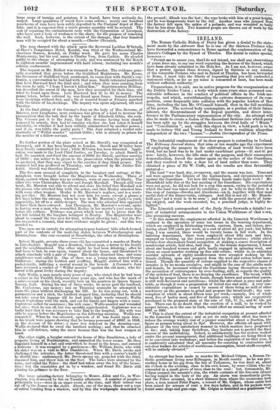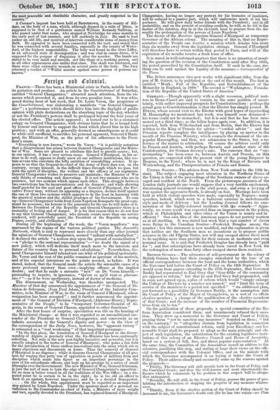IRELAND.
The Roman Catholic Bishop of Derry has given a denial to the state- ment made by the Advocate that he is one of the thirteen Prelates who have forwarded a remonstrance to Rums against the condemnation of the Queen's Colleges by the Synod of Thurles. His denial is rather special, however- " Permit me to assure you, that I do not intend, nor shall any observations of yours force me, to say one word regarding the decrees of the Synod, which have been already submitted to the Holy See. As I am not, however, aware that a protest against these decrees, signed by thirteen or any number of the venerable Prelates who met in Synod at Thurles, has been forwarded to Rome, I must take the liberty of requesting that you will contradict a statement which, so far as my name is concerned at least, has been made without sufficient authority."
Preparations, it is said, are in active progress for the reorganization of the Dublin Trades Union ; a body which some years since possessed con- siderable influence in the conduct of political affairs in the Irish me- tropolis, and which, notwithstanding the extreme democracy of its com- position, came frequently into collision with the popular leaders of that time, including the late Mr. O'Connell himself, then in the full meridian of his power. The revived body contemplate, as a portion of their future labours, the disentombment of the Repeal question, and direct inter- ference in the Parliamentary representation of the city. An attempt will also be made to create a fusion of the discordant factions into which party has been split up by the struggles between the rival balls of " Music ' and "Conciliation "; and, with this object in view, a bold push is to be made to induce Old and Young Ireland to form a coalition altogether independent of the two "houses."—Dublin Correspondent of the Tinges.
The industrial employment of in-door paupers is extending in Ireland. The Kilkenny Journal states, that nine or ten months ago the experiment
of employing the paupers in the cultivation of land would have been tried, but no land was to be had under exorbitant prices-3l. and 4l per acre: lately, however, the idle state of the paupers, and their consequent
demoralization, forced the matter again on the notice of the Guardians, and they resolved to take a dear lot of land rather than none. They obtained a piece of Sir W. Cuffe, and the results are thus favourably pictured—
The land " was hard, dry, overgrown, and the season was late. Time and soil were against the labours of the husbandmen, and circumstances were against the Guardians. Yet how did willing hands make light work ? Mr.
Blanchfield tells this at the last meeting of the Guardians. His expectations were not great ; he did not look for a crop this season, owing to the period at
which the land was taken and its condition; yet he tells us that there is a fine crop of turnips—Swedes and Aberdeens—on it, together with that most useful dish of the dinner-table, cabbages. And this is not all : Mr. Blanch-
field says not a weed is to be seen'' and with the general mode of farm- ing adopted, and the work executed, he, a practical judge, is highly de- lighted." The Limerick correspondent of the Daily News forwards a detailel re- port of industrial arrangements in the Union Workhouse of that Own, also promising success.
"At this moment the employment afforded in the Limerick Workhouse is confined to the operation of some ten looms in the weaving department, which are employed in fabricating tweeds, canvass, linen, and ticken, pro- ducing about 270 yards per week, at a cost of about 4d. per yard ; but before long, I was assured, there would be twenty looms in full work. In the tailoring department, there were employed about fifty men and boys,
engaged on working up the tweed produced by the weavers ; whilst about twenty-four shoemakers found occupation at making a coarse description of nondescript article' half shoe, half clog. In the-female-department, I found
about one hundred women and girls busily engaged in spinning wool, and about an equal number working up flax and cotton; whilst in an adjoining corridor upwards of eighty needlewomen were occupied making up the female clothing, spun and prepared from the wool and cotton before men- tioned. Though the quantity of rations supplied to the respective classes of inmates is by no means excessive, and might in the case of the adults male and female, be increased without the Guardians laying themselves open to the accusation of extravagance by over-feeding, still, as regards the quality of the articles of food, there is no denying the excellence. The bread, which
is baked by pauper labour in the house, though brown and somewhat coarse, is still well-flavoured and nutritious ; whilst the stir-about is pure and pala-
table, as though it were a preparation of boiled rice and milk. A very con- siderable expenditure is caused by reason of there being no mill or other machinery on the premises to grind and prepare the bread-stuffs ; the con- sumption of which is about fifteen tons per week,—namely, five of whole
meal, five of barley meal, and five of Indian corn; which are respectively purchased in the prepared state at the rate of 111., 71. 7.9.' and 61. 158. per
ton. There can be no doubt that the erection of a mill, to be worked by pauper labour, as is the case in Cork, would effect an annual saving of 'some 4001. or 5001.
" This is about the extent of the industrial occupation at present afforded in the Limerick Workhouse ; and as yet its only visible effect has been to reduce the average weekly cost of a pauper somewhat about a' fraction, the figure at present being about Is. Old. However, the officials all speak with pleasure of the very satisfactory manner in which matters have progressed so far ; and taking hope therefrom, they hesitate not to predict the final success of the undertaking. Indeed, so satisfactorily has the system worked under the present management, that additional buildings are being fitted up to be converted into workshops ,• and before the expiration of another year, it is confidently calculated that all necessity for resorting to contractors and out-door traders for articles of workhouse consumption, bread-stuffs excepted, will be entirely obviated."
An attempt has been made to murder Mr. Michael Colgan, a Roman Ca- tholic gentleman living near Kilbeggan, in Meath county. As he was pro- ceeding home in his gig from the fair of Tullamore, he was fired at, about six o'clock in the evemng, close to his own house, by some villain who lay concealed in a small grove of trees close to the road : but, fortunately, Mr. Colgan escaped the assassin's aim, the whole contents of the fire-arm(slugs)
i
having lodged in the body of the gig. An alarm was immediately given, and the Police arrested, at a short distance from where the occurrence took place, a man named Peter Fagan, a tenant of Mr. Colgan, whose cattle bad i
been seized for arrears of rent a few days before, and in his pockets were found some slugs and gun-caps. Mr. Colgan is described as a gentleman of the most peaceable and charitable character, and greatly respected in the country."
A Coroner's inquest has been held at Barretstown, in the county of Kil- dare, on the body of a man, which, although dressed in a suite of frieze, is supposed to be that of a gentleman named William Kennedy Sullivan, or who passed under that name, who stopped at Newbridge for some months in the early part of last summer, and left suddenly in July. He used to lead rather an odd life, and received at intervals considerable sums of money from Bath. He appeared to have been connected with the turf, and stated that he was connected with several families, especially in the county. of Water- ford, of the highest respectability. The body was found in the river Liffey, in an advanced state of decomposition ; and was clad in coarse frieze, it is supposed for the purpose of disguising it after the murder. The bands are stated to be very small and smooth, not like those of a working person, and in all other appearances also unlike that class. The skull was fractured, and there were other extensive wounds on several parts of the body. The Jury returned a verdict of "Wilful murder against some person or persons un- known."



























 Previous page
Previous page